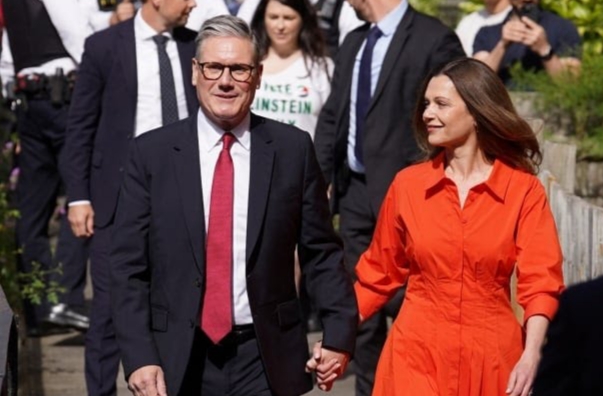
Stammer
Exit polls show Labour ending 14-year rule of Conservatives in UK

The center-left Labour Party is coasting home to victory in Britain’s general election by a landslide, according to a major exit poll.
This is ending a 14-year era of Conservative rule in decisive fashion and putting its leader Keir Starmer on course to become prime minister in the coming hours.
Labour was forecast to win 410 seats, while the Conservatives will drop to just 131 seats, according to the exit poll, a rejection of the ruling party by Britain’s electorate that had been anticipated for months.
The exit poll was conducted by Ipsos for the BBC, ITV and Sky, and has historically been an accurate barometer of how the country has voted. Votes will be counted throughout the night, with Starmer likely to replace Rishi Sunak as prime minister on Friday.
The expected results fall short of some, more dramatic predictions made by pollsters during the campaign. But they mark a severe collapse by the Tories since the last election, in 2019, when former Prime Minister Boris Johnson led the party to a landslide victory.
Since then the party has descended into a bitter internal war, slumping from leader to leader and scandal to scandal. Starmer pinned his disciplined campaign on a one-word promise – “Change” – and benefited from a woeful Tory pitch that failed to reverse the public’s deep reservations about their performance.
The Liberal Democrats were forecast to win 61 seats, according to the exit poll, and will return as Britain’s third-strongest party in Westminster. Reform UK, a right-wing populist group, were forecast 13 seats and the Green Party were forecast two.
Starmer, a former barrister who entered parliament in 2015 and has dragged his party towards the center ground since taking over as leader in 2020, has pledged to revive Britain’s flagging public services while keeping a tight lid on expenditure.
His victory provides an antidote to a rise of populist sentiment across Europe.
But populism played a part in the story of the campaign. The insurgent Reform UK group, led by Nigel Farage, have torn away voters from the Conservatives on an anti-migration pitch, while the Tories lost centrist support in England’s affluent southern regions to the Lib Dems.
Starmer seems set to win fewer seats than Tony Blair did in his 1997 landslide – the last time Labour ousted the Conservatives in an election – but he will rule with a strong parliamentary majority.
While he does, a battle will rage for control of the opposition. Right-wing Tories have made overtures towards Farage’s bloc during the campaign, but have faced opposition from moderate Conservatives keen to once again moor the party in Britain’s political center.
On key foreign policy issues, including Britain’s response to Russia’s invasion of Ukraine, the handover of power is not expected to change policy; Starmer has committed to continuing Britain’s supportive stance towards Kyiv.
He has called for a ceasefire in Israel’s war against Hamas in Gaza, and a simultaneous return of Israeli hostages held by the militant group.
